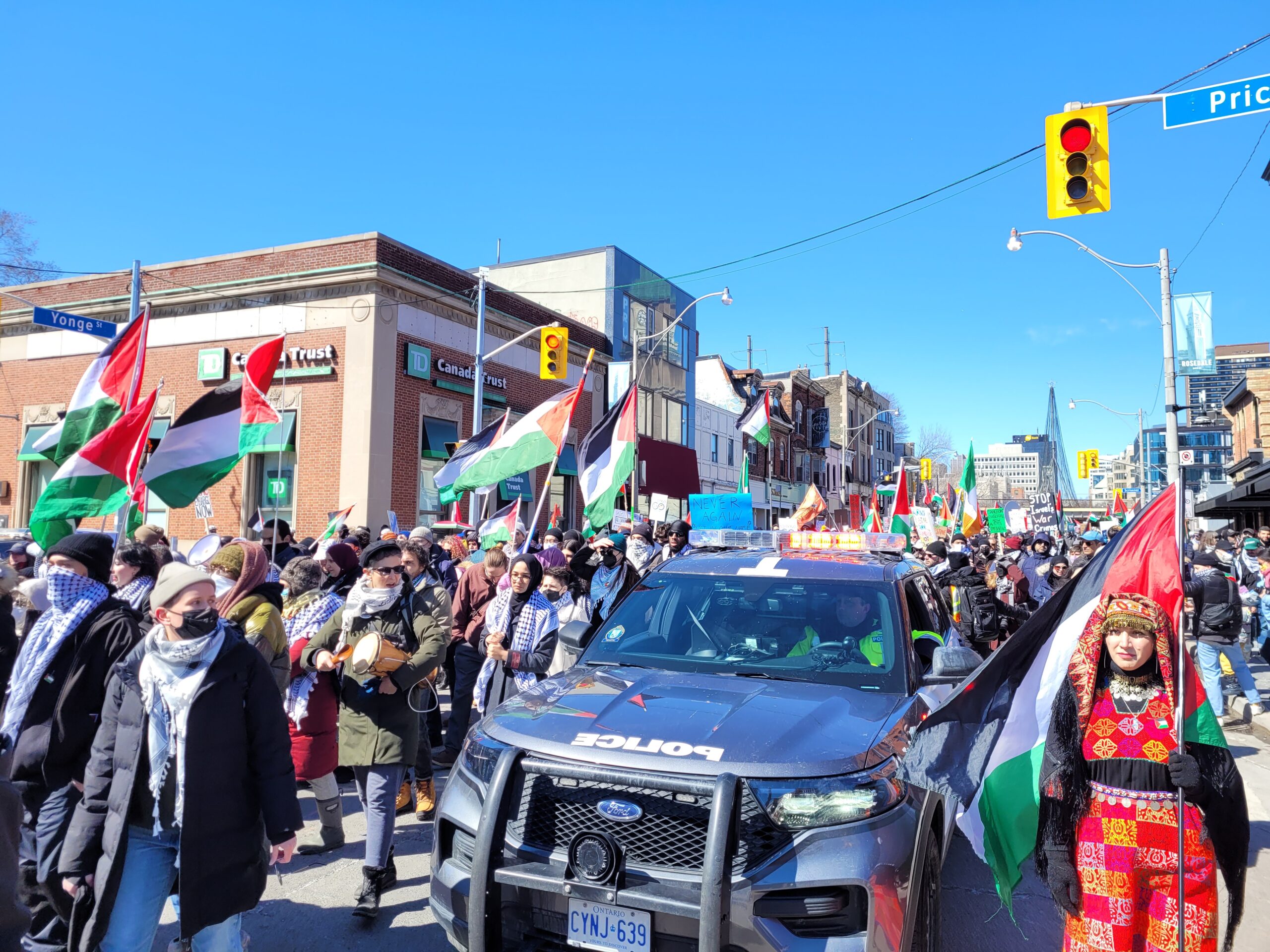
Listen to the full story here:
Elevated police presence at recent Toronto protests and allegations of misconduct by the Toronto Police Service has raised concerns about the safety of demonstrators in the city.
At an Apr. 5 press conference, Deputy Chief Lauren Pogue said the Toronto Police Service have spent more than $12 million policing these demonstrations since Oct. 7, 2023. When addressing the Mar. 30 demonstration where attendees alleged police misconduct, Pogue said “We did respond to what we were facing.”
“A very hostile crowd who actually assaulted our officers threw manure, assaulted a police horse. Those members of the public were arrested.”
In a press conference held outside of Toronto Police Headquarters after Pogue concluded speaking, lawyer Leora Smith, representing some of the people raising concerns, said this type of response is typical when police are accused of misconduct. Smith is co-director of the Community Justice Collective, an organization that has taken on some of the demonstrators’ cases. She also discussed the price tag that TPS attached to their operational response to the protests.
“There’s a pattern that we see in this city whenever there’s police violence and people speaking out against police violence. The police then make arrests and really focus on these arrests,” Smith said. “An assault police charge could be anything [including] laying a finger on a police officer.”
“The police keep talking about how expensive it is to police these protests,” Smith said. “They haven’t explained to us why they’re spending this money.”
Pogue made the public comments in the context of at least two allegations of police misconduct. At an Apr. 1 press conference held by pro-Palestinian demonstrators, two speakers alleged abuse at the hands of police officers at the intersection of Gerrard St. and Parliament St. during a Mar. 30 demonstration
Two men who spoke at the conference detailed their experience with the police. One, who spoke with a visible injury to his eye, said the police beat him as multiple officers pinned him to the ground. Another said that by grabbing him and moving him around, police knocked off his hearing aid before stepping on it. Speakers also said that Toronto police pulled a bystander, who was not involved with the march, to the ground and brutalized him. Footage of the incident has been circulating online.
In a press release on Mar. 31, Toronto police announced they charged a man with stunt driving, and two women with assault of an officer with a weapon, one for throwing horse manure at officers and another for intentionally using a flagpole to “spear” at an officer.
Sima Atri, also a lawyer and co-director of the Community Justice Collective, co-hosts the podcast Counsel Call to provide information to people who may be attending protests. She said it’s important to learn how to prepare for any scenario.
“There is a real lack of transparency and knowledge amongst a lot of people about what happens if you were to get arrested and how individualizing that entire process is,” Atri said. “We’re hoping that by having information ahead of time, they can also make plans ahead of time with people.”
Concerns about the effects these actions have on protestors who may be attending are part of what spurred the creation of Counsel Call, the podcast with Atri as co-host. Aliya Pabani, the other co-host of Counsel Call, said that episode four of the show focuses on the actual experience of being arrested. During an arrest protesting the Toronto Police’s eviction of encampments at Lamport Stadium in 2021, Pabani said she was unprepared for the most distressing aspect.
“The worst part for me was sitting in the court services vehicle, idling for three hours in a confined space, while being hopped up on adrenaline.”
Pabani says she hopes the episode helps demonstrators prepare for lesser known aspects of the process.
By creating Counsel Call, both Pabani and Atri hope to provide tools to people to prepare future protestors. While important, Atri said she sees legal rights as a tactic to defend people after a possible abuse may have occurred.
“If, after the fact, it comes out the police used force unreasonably or searched your apartment unconstitutionally, then we can use that to try to keep evidence out of court, or to try to get a charge withdrawn or people acquitted on their charges.”
Scott Martin is a reporter for On The Record, Winter 2024 with a focus on politics.

